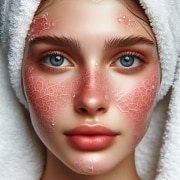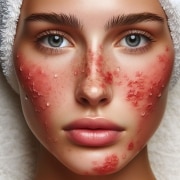How can I prevent dry and itchy skin during menopause and thyroid disease?
As a woman going through menopause or dealing with a thyroid disease, you may have noticed an increase in dry and itchy skin. This can be a frustrating and uncomfortable experience, but there are measures I can take to prevent and alleviate these symptoms. In this blog post, I will share some essential tips and techniques to help you keep your skin healthy and hydrated during this challenging time.
Table of Contents
Key Takeaways:
- Stay Hydrated: Drink plenty of water and use a humidifier to keep the skin moisturized and prevent dryness and itching.
- Moisturize Regularly: Use a rich moisturizer with ingredients like ceramides, hyaluronic acid, and glycerin to nourish and protect the skin during menopause and thyroid disease.
- Avoid Harsh Products: Opt for gentle, fragrance-free skin care products and avoid hot baths, which can strip the skin of essential oils and worsen dryness.
Menopause and Its Impact on Skin
Any woman going through menopause will likely experience changes in her skin. Menopause is a natural part of the aging process for women, marked by the end of menstruation and a drop in estrogen levels. These hormonal fluctuations can result in several skin issues, including dryness, itching, and sensitivity. Understanding the impact of menopause on skin can help you take proactive measures to prevent and manage these symptoms.
Hormonal Fluctuations and Skin Dryness
During menopause, the body’s production of estrogen decreases significantly. This drop in estrogen levels can lead to a reduction in oil production in the skin, resulting in dryness and a loss of elasticity. As a result, women may notice their skin becoming drier, rougher, and more prone to fine lines and wrinkles. Additionally, decreased collagen production can contribute to sagging skin and an overall dull complexion. These changes can be frustrating, but there are steps you can take to combat them.
Itchy Skin and Menopause: Causes and Management
Itchy skin is another common complaint during menopause, and the causes can be multifaceted. Hormonal imbalances can disrupt the skin’s natural barrier function, leading to increased sensitivity and itchiness. Additionally, conditions such as vaginal dryness, hot flashes, and stress can exacerbate itching. It is crucial to address these symptoms promptly to avoid complications such as skin infections or lesions. Managing itchy skin during menopause may require a multi-faceted approach, including lifestyle changes, skincare adjustments, and possibly medical intervention. Seeking guidance from a healthcare professional can help you devise a personalized plan to address your skin concerns.
Thyroid Disease and Skin Health
One of the lesser-known impacts of thyroid disease is its effect on the skin. Both hypothyroidism and hyperthyroidism can have significant implications for the skin’s health and appearance. Understanding these effects can help you take proactive steps to address any skin concerns that may arise as a result of thyroid disease.
Hypothyroidism and Its Effect on the Skin
When the thyroid gland is underactive and not producing enough hormones, a condition known as hypothyroidism, it can lead to a range of skin issues. One of the most common manifestations is dry, rough, and pale skin. This occurs because the slowed metabolism associated with hypothyroidism reduces the sweating mechanism and oil production in the skin, leading to dehydration and decreased elasticity. In addition, hypothyroidism can cause inflammation, which may result in puffiness and swelling in the face, particularly around the eyes.
Hyperthyroidism and Skin Concerns
On the other hand, hyperthyroidism, an overactive thyroid gland, can also have noticeable effects on the skin. The increased metabolic rate associated with hyperthyroidism can lead to excessive sweating, resulting in warm, moist skin. Additionally, some individuals with hyperthyroidism may experience thinning of the skin, making it more prone to bruising and injury. In some cases, individuals with hyperthyroidism may also develop a condition known as pretibial myxedema, characterized by localized swelling and thickening of the skin, typically on the shins.
Preventative Measures and Treatments
However, there are several preventative measures and treatments that can help alleviate dry and itchy skin during menopause and thyroid disease. It is important to take a holistic approach to managing these conditions, addressing both the internal and external factors that contribute to skin health.
Skincare Strategies to Combat Dryness
One of the most effective ways to combat dry and itchy skin is by implementing a consistent skincare routine. I recommend using a gentle, fragrance-free cleanser and moisturizer that are designed for sensitive skin. Look for products with ingredients like hyaluronic acid, shea butter, and ceramides, which can help lock in moisture and repair the skin barrier. Avoid harsh exfoliants and alcohol-based products, as these can further exacerbate dryness and irritation. Additionally, consider incorporating a humidifier into your home to add moisture to the air, especially during the dry winter months.
Dietary and Lifestyle Choices to Improve Skin Health
In addition to skincare, making dietary and lifestyle choices can also greatly impact skin health during menopause and thyroid disease. Drinking plenty of water is crucial for hydrating the skin from the inside out. I also recommend incorporating foods rich in omega-3 fatty acids, such as salmon, walnuts, and flaxseeds, into your diet to help reduce inflammation and promote skin elasticity. Furthermore, limiting alcohol consumption and quitting smoking can have a positive impact on skin health, as these habits can dehydrate the skin and contribute to premature aging. Additionally, managing stress through activities like yoga, meditation, or deep breathing exercises can help mitigate the effects of hormonal fluctuations on the skin.
Preventing Dry and Itchy Skin During Menopause and Thyroid Disease
Upon reflecting on the information provided, I have learned that maintaining proper hydration, using moisturizers, and avoiding irritants can help prevent dry and itchy skin during menopause and thyroid disease. Additionally, incorporating omega-3 fatty acids and vitamin D into my diet, and seeking medical advice for hormone replacement therapy or thyroid medication adjustments can also aid in managing skin dryness and itchiness. By taking a proactive approach to skincare and considering the underlying hormonal changes, I can effectively prevent and alleviate the discomfort caused by dry and itchy skin during menopause and thyroid disease.
















Leave a Reply
Want to join the discussion?Feel free to contribute!